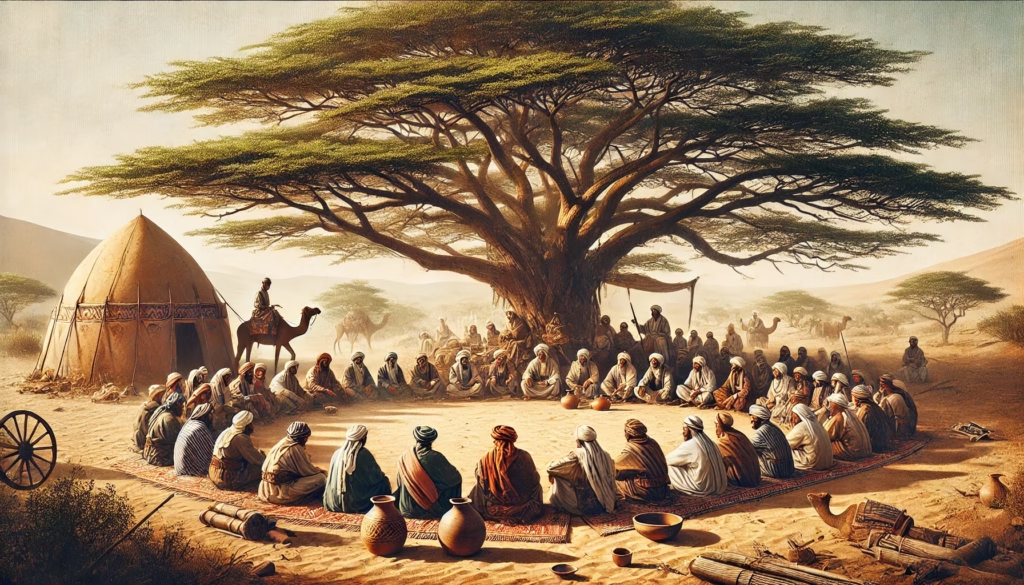Table of Contents
Introduction
This is the seventh installment in the series titled “In the Brightened Corridors of the Prophet’s Life Story“. This article addresses ALLAH’s choice of Arabs as the recipients of Islam’s message, distinguishing them among all nations. Click here to to explore the entire series, ALLAH willing.
The Wisdom Behind ALLAH’s Choice of Arabs for HIS Message
This article explores a profound question that many might overlook: Why did ALLAH send HIS Prophet (Peace and Blessings be upon Him) to the Arabian Peninsula? Why did ALLAH, the Blessed and Exalted, choose the Arabs to receive HIS message?
Scholars have extensively reflected on the wisdom behind ALLAH’s choice of Arabs for this noble responsibility. Understanding this helps us identify which individuals, groups, and nations are naturally more inclined to embrace the truth, as well as those who may be less receptive. This insight continues to guide us in our efforts to spread the message in our modern context.
One key observation made by scholars is the simplicity of the Arabs. They were largely free from the complex philosophies deeply ingrained in the cultures of the Indians, Romans, and Persians. This simplicity was significant, as it is well-known to those who engage with intellectuals, theorists, and philosophers that such environments often create barriers to accepting truth. Minds entrenched in intricate theories and arguments tend to resist straightforward truths, requiring carefully crafted and elaborate presentations to align with their intellectual patterns.
The Simplicity and Strong Will of the Arabs: A Unique Readiness for the Message
The Arabs were distinct in this regard. They were not a people of philosophy, and their wisdom, often expressed through poetry, was straightforward and practical. Unlike the Byzantines, whose culture gave rise to the term “Byzantine argument”, the Arabs avoided overly complex reasoning. For instance, Indian philosophies were deeply intricate, and the Persians had a rich literary and organizational heritage marked by complexity. The Arabs, however, were characterized by their simplicity, which made them more naturally suited to receiving the divine message.

Another key trait was their adherence to their original nature (fitrah) and their strong will. This strength of character was evident in several historical moments, such as:
- Suhail bin Amr’s stance at the Treaty of Hudaibiya.
- Ikrimah’s resolve at the Battle of Yarmouk.
- The words of those who gave the pledge at Aqabah.
- Saad bin Muadh’s powerful statement during the Battle of Badr.
These examples showcase a people of remarkable determination. Their words were binding, and when a man gave his word, he followed through.
A notable instance is Saad bin Muadh addressing the Prophet (Peace be upon Him) during the Battle of Badr. When the Prophet (Peace be upon Him) inquired about their readiness, Saad replied with unwavering conviction:
“Proceed with what ALLAH has commanded you. By ALLAH, we will never disobey You. If You were to lead us into the sea and plunge into it, we would plunge with You, not a single man among us would stay behind. We are truthful in war, patient in battle, and perhaps ALLAH will show You from us what will please Your eyes“1
The Strong Will and Commitment: A Key to ALLAH’s Choice of Arabs
Another striking example of the Arabs’ strong will is the account of Uqba bin Nafi, who, upon completing the conquest of Morocco, waded into the waters of the Atlantic Ocean and declared:
“If I knew there was land beyond you, I would have charged through with my horse to reach it“

Similarly, during the Pledge of Aqabah, the companions pledged their allegiance to the Prophet (Peace be upon Him) with full awareness of the consequences. Some among them cautioned: “O people, understand what you are pledging to this man. You are committing to wage war against both the red and the black among people, and the Arabs will unite their bows against you“. Despite this warning, their response was firm:
“Remove your hand, for we have given our pledge to the Messenger of ALLAH“2
This resolute nature reflected the Arabs’ unwavering commitment to their word. When an Arab gave his word, he fulfilled it, no matter the cost. This trait was so deeply ingrained that Arab poets were often known for verses that sealed their fate; a man would speak a line of poetry and stand by it, even if it led to his destruction. This strength of will, unique and defining, was one of the reasons for ALLAH’s choice of Arabs as the recipients of HIS message.
The Simplicity and Resilience of the Arabs: A Shield Against the Corruption of Luxury
The third notable characteristic was that the Arabs were largely isolated from the corrupting influences of civilization and luxury. Unlike the Persians, Romans, and other advanced civilizations of the time, the Arabs were not a people of indulgence or excessive comfort. History and scripture show that those immersed in luxury often resist divine calls. As ALLAH says in the Quran:
“And similarly, WE did not send before you any warner into a city except that its affluent said, “Indeed, we found our fathers upon a religion, and we are, in their footsteps, following“3
(Suraat ‘Az-Zukhruf, 43:23)
In another verse, ALLAH states: “And those who wronged pursued what luxury they were given.” (Surah Hud: 116).
“But those who wronged pursued what luxury they were given therein, and they were criminals“4
(Suraat Huud, 11:116)
Luxury often creates a barrier between individuals and the willingness to embrace a message rooted in seriousness, sacrifice, and responsibility. Those who are accustomed to comfort and ease are typically less inclined toward faith and less willing to endure the sacrifices it demands. Conversely, the more a person maintains simplicity and strong will, the more capable they are of accepting the message and showing enthusiasm for faith.

This also highlights a key distinction between youth and the elderly. Older individuals are often more rigid in their ways, having grown accustomed to their lifestyles and, in many cases, to luxury. This rigidity makes them less receptive to change or to accepting a new call. In contrast, the Prophet (Peace and Blessings be upon Him) described youth as having softer hearts and greater determination.
ALLAH’s Choice of Arabs: A Nation Prepared for the Divine Message
In summary, the Arabs were a nation untouched by the excesses of civilization, vibrant with life, and uniquely prepared to carry the divine message. This readiness is evident even in historical accounts from foreign travelers who visited the Arab world within the last century. Among them was British Colonel Ronald Victor Bodley, who, despite some errors in his writings, authored a notable book titled “The Messenger: The Life of Mohammed” (Peace and Blessings be upon Him).
Influenced by the Arabs of the Arabian Peninsula, Iraq, the Levant, and North Africa, he described them as the people who practice the greatest democracy on earth. He observed that true equality existed among the Arabs, where a tribal sheikh was no different from an ordinary man of the tribe, except through noble deeds.
This unique quality of the Arabs—a people not weakened by the burdens of civilization, unspoiled by luxury, and unencumbered by complex philosophies—was accompanied by their strong will. These traits made them particularly suited for the divine message. As scholars like Ibn Khaldun have noted, the Arabs were not a humiliated people; unlike the conquered and subjugated populations of Persia, Rome, India, and China, they lived with dignity and refused to bow to oppressive kings. Islam, being a message of honor and liberation, naturally resonated with a people who valued their freedom and self-respect.

The Prophet (Peace and Blessings be upon Him) led them not through force or oppression but with love, wisdom, and His perfect character. These qualities of the Arabs made them far more suitable for receiving ALLAH’s message than the defeated and humiliated nations who had been crushed under the rule of tyrannical kings.
Arab poets even proudly celebrated their independence, saying:
“And we have long, bright days In which we refused to submit to the king’s rule”
These very qualities not only made the Arabs the ideal recipients of ALLAH’s choice for HIS message but also serve as a reminder of the characteristics we need in those who are called to Islam and those who work for its cause today.
We ask ALLAH, the Blessed and Exalted, to teach us what benefits us, to benefit us with what HE has taught us, and to increase us in knowledge.
Sources:
- Mohamed Elhamy. محمد إلهامي | في أروقة السيرة | 7. سر نزول الإسلام على العرب. YouTube Video.


المعلم والأب الروحي
السيد إلهامي. شكرا جزيلا على كل حرف كتبته. في ..الحقيقة دائما أتشجع بكلماتك لاكن “دوما أخاف عليك.”
ندرس مقالاتك ونفككها كل الوقت.وكل كلمة قلتها هي دفعة وموضوع تركيز ونقاش بالنسبة لنا.
نسأل الله لك السلامة
نسأل الله شهادة في سبيله
أدعوا لنا.